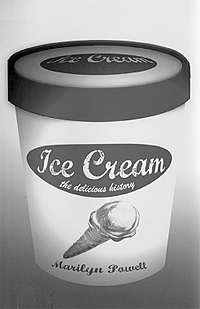Several years ago, Marilyn Powell, Ph.D. ’66, sat at a gelateria with several friends, indulging herself while playing an impromptu game: pick a famous person and guess which combination of gelato and toppings would have been his or her favorite. Sigmund Freud, they agreed, would have chosen “a cup of black coffee with a scoop of vanilla ice cream in it and Schlag, whipped cream, on top.”
 The game was part of Powell’s enviable “job” in researching her new book, Ice Cream: The Delicious History (Overlook). Her long-standing love of the dessert began in childhood when her older brother sneaked store-bought ice cream into the house for her and her sister. It wasn’t until recently, however, that Powell was able to blend work and play. She had spent the last 20 years producing, writing, and broadcasting segments for Ideas, a show broadcast on Canada’s CBC radio network. In 2001, she decided to produce a show on her favorite treat. Ideas usually deals with weightier topics, like the history of Russian literature, but Powell says she thought it “would be fun to treat a small subject in a serious way.” A publisher heard the segment, contacted her, and convinced her to explore the possibility of transforming her short radio piece into a book.
The game was part of Powell’s enviable “job” in researching her new book, Ice Cream: The Delicious History (Overlook). Her long-standing love of the dessert began in childhood when her older brother sneaked store-bought ice cream into the house for her and her sister. It wasn’t until recently, however, that Powell was able to blend work and play. She had spent the last 20 years producing, writing, and broadcasting segments for Ideas, a show broadcast on Canada’s CBC radio network. In 2001, she decided to produce a show on her favorite treat. Ideas usually deals with weightier topics, like the history of Russian literature, but Powell says she thought it “would be fun to treat a small subject in a serious way.” A publisher heard the segment, contacted her, and convinced her to explore the possibility of transforming her short radio piece into a book.
 |
| Marilyn Powell loves ice cream. |
| Overlook Press |
Though initially doubtful about writing an entire book on the subject of ice cream, Powell eventually settled on a less scientific, more personal approach to her topic. Though she reports that she did spend plenty of time eating ice cream, gelato, sorbets, and ices, she also researched the plentiful mythology of ice cream in both history and literature. “It’s not a consumer’s guide,” she says. “I did this more to please myself. I was really interested in the stories. When I came across a story that amused me and that I hadn’t known before, that was a good day.” She recounts, for example, a vignette in Cornelia Otis Skinner’s Elegant Wits and Grand Horizontals, a book about Paris in the 1890s: “It concerned a wealthy baron by the name of Monsieur de Saint-Crick. Every afternoon, he used to visit the famous restaurant, Tortoni’s. He’d sit at a table outside the restaurant and order two different kinds of ice creamstrawberry and vanilla. And when they arrived, he’d remove his shoes and put the vanilla into the right one and the strawberry into the left. If he got the arrangement wrong, he’d start all over again, first taking care to empty his shoes on the pavement.”
Because Powell concocted Ice Cream by following her fancy, the result is a mix of fiction, fact, and practicalityfor those who can’t wait to make their own ice cream, old and new recipes are sprinkled through the book. She mentions a grand fête at Marly in 1704, celebrating the birth of a great-grandson of Louis XIV, at which pink, green, yellow, and white ices, flavored with orange blossoms, coffee, muscat grapes, pistachios, pineapples, and other rare ingredients, were served. A long-ago Harvard special student and donor, Count Rumford, puts in an appearance as the inventor of Omelette Surprise: ice cream enclosed in meringue. In another chapter, Powell describes the role of ice cream in the nineteenth- and early twentieth-century temperance movement: ice-cream sodas were publicized as a family-friendly alternative to alcohol. What would those teetotalers have thought of the comment, attributed to Voltaire, with which Powell ends the book? “Ice cream,” he supposedly said, “is exquisite. What a pity it isn’t illegal.”
~Emer Vaughn





